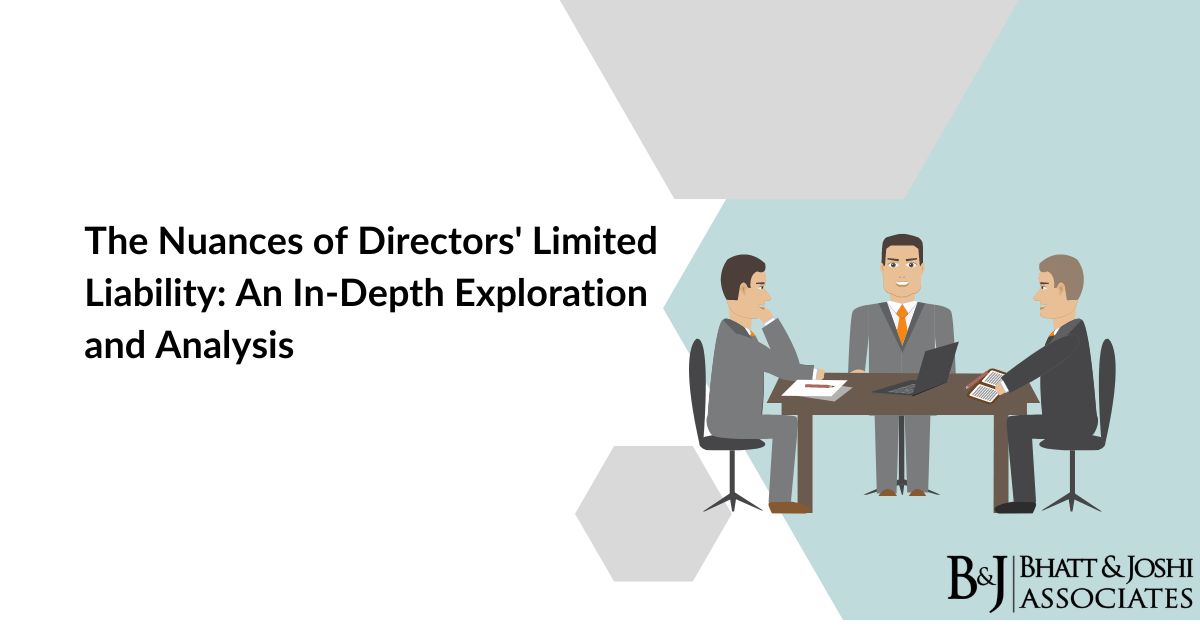Directors’ Limited Liability: Exploring Nuances through In-Depth Analysis

Introduction: Unveiling Directors’ Limited Liability
The role and liability of directors in a company’s affairs have been subjects of extensive legal debate and interpretation. This article delves into the complexities surrounding directors’ limited liability, particularly focusing on the recent judgment by the Supreme Court of India in Susela Padmavathy Amma v. M/s Bharti Airtel Limited. Through an analysis of relevant case laws, statutory provisions, and regulatory directives, this article seeks to provide a comprehensive understanding of the scope of directors’ liability and the factors influencing their culpability in cases of non-compliance. In the realm of corporate governance, directors play a pivotal role in steering the course of a company’s operations. However, the extent of their liability for the company’s actions has been a matter of intricate legal analysis. The Companies Act, 2013 delineates the framework within which directors operate and outlines their responsibilities. Central to this framework is the concept of limited liability, which shields directors from personal liability for the company’s debts and obligations. Yet, questions persist regarding the circumstances under which directors can be held accountable for acts of non-compliance. Against this backdrop, the Supreme Court’s recent pronouncement in Susela Padmavathy Amma v. M/s Bharti Airtel Limited has reignited discussions on the scope of directors’ limited liability. This article aims to dissect the nuances of directors’ liability, drawing insights from pertinent case laws, statutory provisions, and regulatory directives. By critically examining the legal landscape, this article endeavors to offer a comprehensive analysis of the factors influencing directors’ culpability in instances of non-compliance.
Factual Background and Judicial Observations:
The case of Susela Padmavathy Amma v. M/s Bharti Airtel Limited revolves around allegations of dishonoring post-dated cheques by Fibtel Telecom Solutions, a company with which Ms. Susela Padmavathy Amma was associated as a director. Despite her non-involvement in the day-to-day affairs and absence as a signatory to the cheques, Ms. Susela found herself embroiled in legal proceedings initiated by Bharti Airtel Limited. The crux of the matter lies in determining whether mere directorship entails liability for the company’s offenses. In its decision, the Supreme Court elucidated that the position of a director, in and of itself, does not ipso facto render one liable for the company’s transgressions. Instead, liability attaches only when specific allegations establish the director’s direct involvement or responsibility in the impugned conduct. The Court underscored the necessity of delineating the roles and responsibilities of directors, particularly distinguishing between managing directors and ordinary directors. While the former bear primary responsibility for managing the company’s affairs, the latter’s liability hinges on their degree of involvement in the alleged wrongdoing.
Analyzing Case Law: Directors’ Limited Liability Precedents
The jurisprudential landscape concerning directors’ liability offers valuable insights into the evolving principles governing corporate governance. Several landmark cases have shaped the contours of directors’ limited liability and delineated the parameters for assessing culpability in instances of non-compliance. In Pooja Ravinder Devidasani v. State of Maharashtra and Agritech Hatcheries & Food Ltd. v. Valuable Steel India (P.) Ltd., the courts reiterated that liability for corporate offenses extends only to individuals directly responsible for the conduct of the company’s business. Similarly, in S.M.S. Pharmaceuticals Ltd. v. Neeta Bhalla, the court emphasized that mere directorship does not imply active involvement in the company’s day-to-day operations, thereby narrowing the scope of directors’ liability. Moreover, cases such as Dr. Uppal Devinder Kumar v. SEBI and SEBI v. Gaurav Varshney underscore the significance of delineating the specific roles and responsibilities of directors to ascertain liability accurately. These precedents highlight the need for a nuanced approach in attributing liability to directors based on their actual involvement and authority within the company.
Director’s Role and Definition of ‘Officer-in-Default’:
Central to understanding directors’ liability is the delineation of their roles vis-à-vis the concept of an ‘officer-in-default.’ While directors collectively oversee the company’s affairs, their individual liability is contingent upon their level of involvement and authority. Unlike managing directors, ordinary directors are not inherently responsible for the day-to-day management of the company. Therefore, liability for non-compliance rests upon those directors who are directly involved or complicit in the impugned actions.
The definition of an ‘officer-in-default,’ as articulated in the Companies Act, 2013, underscores the principle of individual culpability. This provision reflects a legislative intent to hold accountable only those directors who bear responsibility for complying with statutory obligations. Moreover, historical amendments to the Companies Act signify a deliberate effort to refine the definition of an ‘officer-in-default’ and streamline the attribution of liability to culpable individuals.
Duties of Directors under the Companies Act, 2013:
Section 166 of the Companies Act, 2013 delineates the duties of directors, emphasizing their fiduciary obligations towards the company and its stakeholders. While directors are expected to act in good faith and exercise due diligence, the statute does not impose blanket liability on all directors for the company’s actions. Instead, directors are held accountable based on their specific duties and responsibilities as delineated by law and company policies.
MCA Directive to RD and ROCs:
The Ministry of Corporate Affairs (MCA) has issued directives to Regional Directors and Registrars of Companies (ROCs) to scrutinize the involvement of concerned officers in instances of non-compliance. This directive underscores the importance of ascertaining individual culpability based on concrete evidence rather than presumptive assumptions. By emphasizing the need for thorough investigation, the MCA seeks to ensure fairness and accuracy in attributing liability to directors.
Conclusion: Understanding Directors’ Limited Liability
In conclusion, the issue of directors’ limited liability is a multifaceted one, influenced by legal principles, judicial interpretations, and regulatory directives. While directors enjoy the protection of limited liability, their culpability for corporate offenses hinges on their individual roles, responsibilities, and level of involvement. The recent Supreme Court judgment in Susela Padmavathy Amma v. M/s Bharti Airtel Limited has provided valuable clarity on the subject, emphasizing the need for a nuanced approach in attributing liability to directors. Moving forward, it is imperative for companies to delineate the roles and responsibilities of directors clearly and ensure adherence to statutory obligations. Similarly, regulators must exercise diligence in investigating instances of non-compliance and ascribing liability based on concrete evidence. By fostering transparency and accountability, stakeholders can uphold the integrity of corporate governance while safeguarding the interests of all parties involved.









